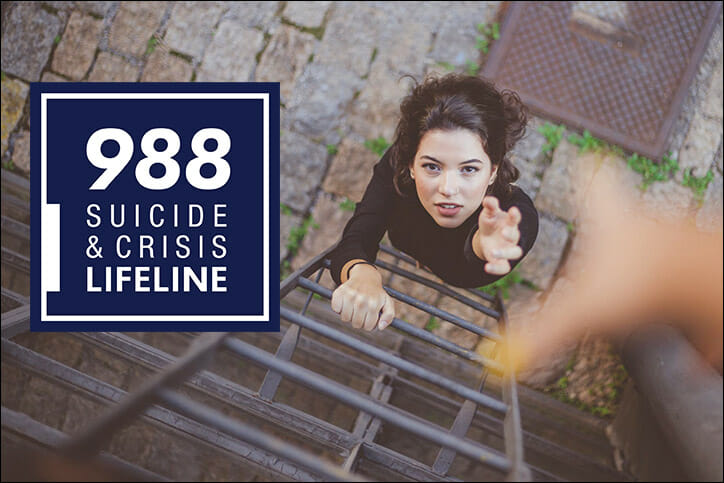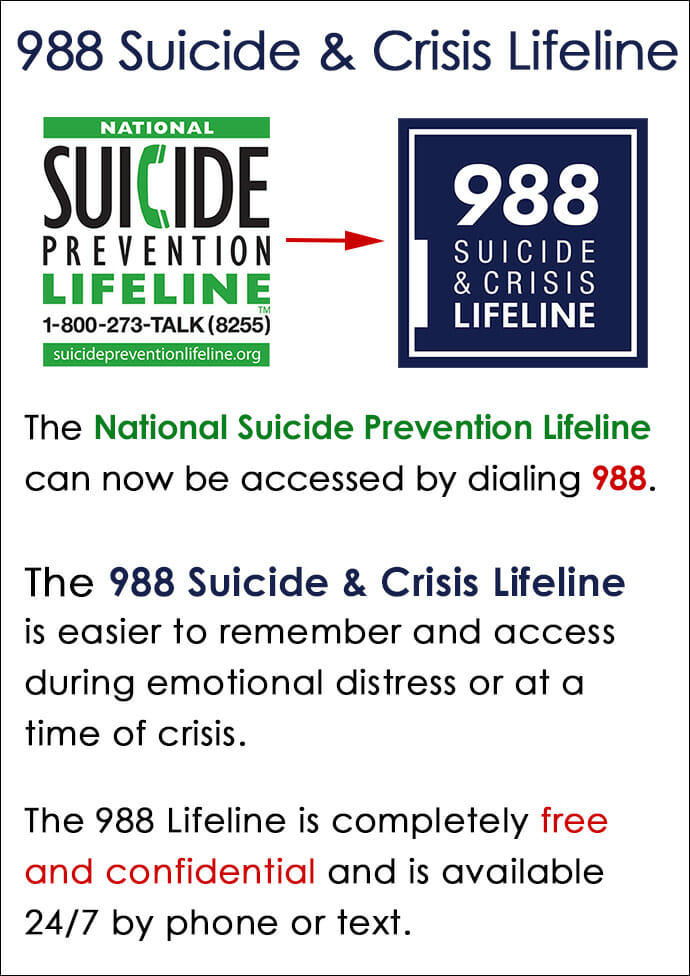Table of Contents
The 988 Suicide & Crisis Lifeline, previously known as the National Suicide Prevention Lifeline, is now active in all states in the U.S. and operates 24 hours a day, seven days a week.
The new suicide hotline number makes it easier for anyone struggling with thoughts of suicide or experiencing severe emotional distress to receive support by simply dialing or texting 988.
The 988 Suicide & Crisis Lifeline is Free and Confidential
The original Suicide Prevention Lifeline was launched in 2005 by the Substance Abuse and Mental Health Services Administration (SAMHSA) and is still available today by calling 1-800-273-TALK (8255).
The creation of the new 988 Suicide & Crisis Lifeline using the 988 dialing code makes the service much more accessible and easier to remember, especially in an emergency situation.
If you or someone you know is struggling or in crisis, call or text 988, or use the online chat function at 988lifeline.org.
September is Suicide Prevention Month
The month of September is recognized nationally throughout the United States as Suicide Prevention Month.
During the month of September, survivors of suicide, their allies, mental health advocates, and prevention organizations work to promote suicide prevention awareness.
Unfortunately, suicide is the 12th leading cause of death in the United States.
Research from the Centers for Disease Control and Prevention shows that more than 12 million adults thought about suicide in 2020, more than 3 million made a plan, and an estimated 1.2 million survived a suicide attempt.
While thoughts of suicide are not uncommon, they may indicate that there are deeper, more serious underlying issues that need treatment.
Anyone can be affected by poor mental health, regardless of age, gender, or background. Getting treatment for mental health issues is vital, as suicide can be the result of untreated depression, anxiety, substance abuse, and other mental illnesses.
Suicide Prevention Week in September
Suicide Prevention Week is an annual campaign in the U.S. that takes place during the first or second week of the month that corresponds with World Suicide Prevention Day on September 10 every year.
While data shows that more women than men consider suicide, men are four times more likely to die by suicide. Being able to recognize the warning signs of suicide in oneself or others can help save a person’s life.
According to the National Institute on Mental Health (NAMI), some of the warning signs of suicide can include the following.
A person talking about:
- Wanting to die
- Feeling like they are a burden to others
- Guilt and shame that they are carrying
A person who is experiencing:
- Severe emotional or physical pain
- Extreme sadness, anxiety, agitation, or are being deeply angry
- Depression, suffering from feelings of hopelessness and worthlessness, feeling trapped, and thinking that they have no good reason to live
Behavioral changes that can include:
- Using drugs and alcohol much more often than before
- Withdrawing from loved ones, friends, and activities once cherished
- Saying unexpected goodbyes, giving away cherished items, or suddenly making a will
- Displaying extreme mood swings, from sadness to rage
- Eating or sleeping much more or much less
- Taking unnecessary risks, such as driving too fast or intentionally putting oneself in harm’s way
All of these warning signs are indicators that someone may be in crisis. Calling or texting the 988 Suicide & Crisis Lifeline at 9-8-8 can link a person in distress to needed mental health resources in their area and help that individual get much needed treatment.
Treatment for Suicidal Thoughts and Ideations
Research shows that 46 percent of people who die by suicide suffered from a diagnosed mental illness, and that 90 percent showed at least symptoms of a mental health condition.
Fortunately, there is treatment for poor mental health that can include medications, combined with counseling that can get to the root of destructive thoughts and behaviors.
A physician might also request a physical exam and blood work because in some cases, suicidal thoughts can be linked to underlying health conditions, such as chronic pain.
Doctors will likely also request a list of medications that a person is taking because some over-the-counter and prescription drugs can cause suicidal thinking.
Finally, substance use disorders, such as excessive alcohol consumption or drug abuse, can cause extreme feelings of shame and guilt and lead to suicidal thoughts, ideations, and attempts.
It’s common for people with mental health issues to use drugs or alcohol as a coping mechanism that can lead to a co-occurring condition of addiction.
When this happens, a dual diagnosis treatment program may be necessary for recovery from both the addiction and mental health condition.
Fortunately, effective treatment for addiction to drugs or alcohol combined with mental illness very often reduces suicidal thoughts or tendencies.
Help is Available at the 988 Suicide & Crisis Lifeline
Many people who have dealt with poor mental health, suicidal thoughts, and even attempts have gone on to lead happy, healthy, and productive lives after seeking help and getting treatment.
Research shows that the people experiencing a suicidal crisis respond well when approached by another person who is genuinely concerned for them.
The goal of the 988 Suicide & Crisis Lifeline is for individuals, families, and friends, no matter where they live, to have easy access to the resources they need to discuss suicide prevention and seek help.




